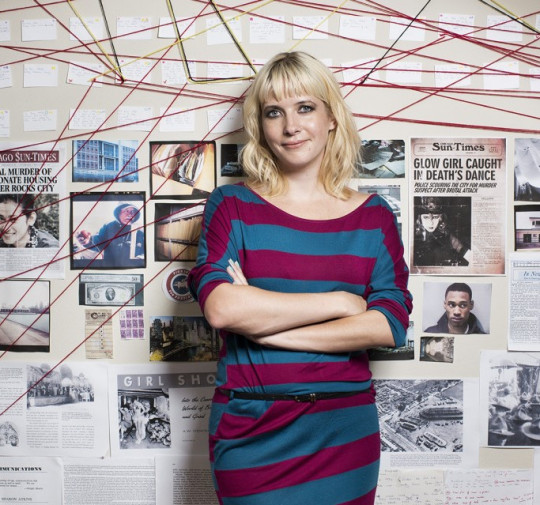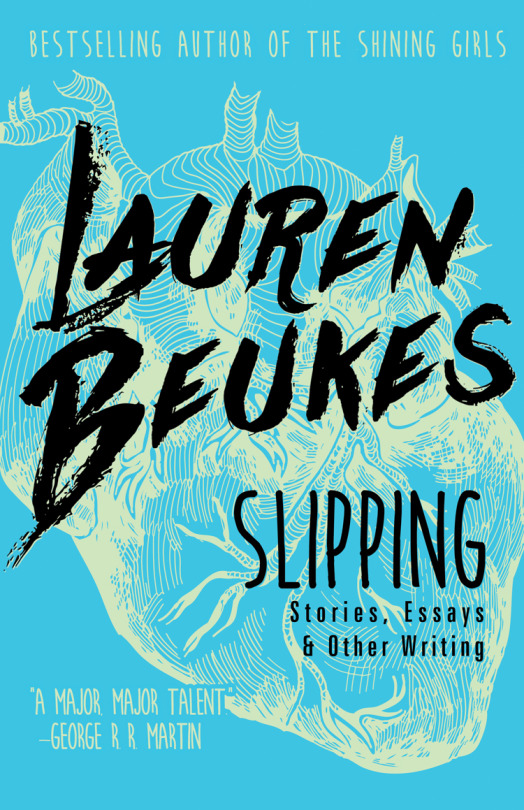SLIPPING delivers Lauren Beukes’ acerbic, sharp, and intuitive writing

FAIRY BOOKMOTHER praises Lauren Beukes’ SLIPPING: STORIES, ESSAYS, & OTHER WRITING.
Beukes’s writing is acerbic, sharp, and intuitive, and I was drawn in immediately to many of her stories. SLIPPING is a collection of stories written over about ten years for various other publications, and I would have really liked to have some background information before or after the stories to know when and why each of these stories were written.
My favorite stories were “Princess,” “Exhibitionist,” “Ghost Girl,” and “Dial Tone.” Each of these stories made me whisper what after I finished reading them. Beukes’s writing is at the same time subtle and straightforward. She does not shy away from difficult or terrifying imagery, and she makes you think about why she uses that imagery to explore some weird aspect of human life. Many of her stories cross the genre line between fiction and science fiction, and while a lot of it seems weird at times, it’s also so eerily recognizable. Beukes’s writing asks us why we consider “commonplace” and “everyday” as commonplace and ordinary, because isn’t life weird?
Over on INSTAGRAM, the Fairy Bookmother shares an excerpt from the Beuekes short story “Confirm/Ignore.”
On TWITTER, THE BOOK LOUNGE recommends the collection.
#giftideas The thrilling new collection SLIPPING: STORIES, ESSAYS, & OTHER WRITING. by perennial favourite author @laurenbeukes.

DJ Cockburn on his COCKBURN’S ECLECTICS excerpts Lauren Beukes’ 2011 essay from THE WORLD SF BLOG.
The protagonists of both Zoo City and Slipping, Beukes’s protagonists were very different characters, but what they had in common was being young black South African women, which led her to describe the process of writing the ‘other’ for the World SF blog.
As ever with my greater minds posts, this is a set of thoughts inspired by what Beukes wrote, and I’m not trying to repeat or reply to it. Please have a look at her much more concise writing on the subject. I’m calling her a greater mind for a reason.
<snip>
Beukes starts with the obvious point that any fictional character is ‘other’, in that they are not us:
Unless you’re writing autobiography, any character you write is going to be The Other.
But that’s not really what we’re talking about here. We’re talking about the authentic portrayal of someone with very different life experiences than our own. Even if we create a completely fictional culture, our characters’ experiences are likely to reflect experiences of real people in the real world. If we don’t portray them authentically, someone who knows better than us is going to lose their suspension of disbelief when they read it. That alone is a good reason for getting it right, but it can also lead to being slated by reviews or on social media for being insensitive.
<snip>
Cultural conversations
We can gather a lot vicarious experience of different personalities without going out of our way to find them, and we can use that experience to write different characters. Unless we go out of our way, our vicarious experience will be limited to people who share the same cultures (sub or super) as we do. That won’t stop us writing characters from other cultures, but the limits of our experience will make it very unlikely that we’ll get them right. We’re going to have to take that step out of our way.
As Beukes says:
The only way to climb into that experience is to research it, through books or blogs or documentaries or journalism or, most importantly and obviously, talking to people.
As an introvert and worse, an Englishman, the idea of spending ‘a week just walking round Hillbrow and talking to people’ is terrifying. That’s not because I lived in Cape Town long enough to absorb the capetonian conviction that Johannesburg is one step removed from a war zone, but because I didn’t live there long enough to dislodge my own cultural indoctrination that taught me you don’t just walk up to someone and start babbling at them.So it’s with some reluctance that I admit Beukes’s point. Conversation is the best way to access experiences other than our own. The written word can only go so far, even when people write about themselves. Very few writers can resist a bit of self-curation, subconsciously or otherwise. The same problem arises if we simply ask someone to tell me about their culture or subculture. When talking about the mores of their own culture, people often lead with the absolute ‘rule’ that is most often broken. They’re not being intentionally dishonest, it’s just that it’s at the front of their mind because there are constant arguments about it. Other mores that may seem more strange to an outsider and are more rigidly followed don’t get mentioned because people don’t give them much thought.The only way to develop an understanding of such things is to get to know someone from that culture.
For more information about SLIPPING: STORIES, ESSAYS, & OTHER WRITING, visit the Tachyon page.
Cover art by Clara Bacou
Design by Elizabeth Story
